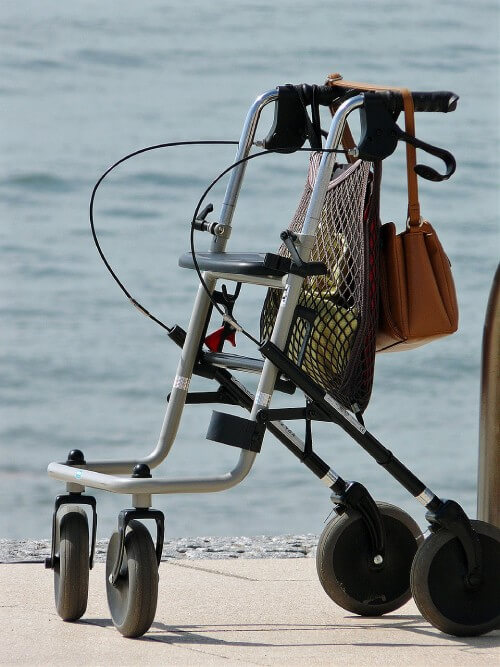Navigating the labyrinth of health insurance coverage can be a daunting task. One frequently asked question among senior citizens revolves around the pivotal topic of mobility aids. Specifically, does Medicare pay for senior walkers? The answer is a resounding ‘Yes.’ Let’s delve deeper into the specifics of Medicare coverage and how it extends to cater to senior walkers.
What is Medicare?
Medicare is a federal program in the U.S. that provides health insurance coverage to individuals aged 65 and older. It also covers certain younger individuals with disabilities.
Medicare is divided into four distinct parts: Part A (Hospital Insurance), Part B (Medical Insurance), Part C (Medicare Advantage), and Part D (Prescription Drug Coverage).
Medicare Coverage for Senior Walkers

Under Medicare Part B, durable medical equipment (DME) like walkers is covered. To qualify for this coverage, a Medicare-enrolled doctor or other healthcare provider must deem the walker medically necessary.
Once the healthcare provider writes a prescription, Medicare will cover 80% of the approved amount. The remaining 20% will be the patient’s responsibility unless they have supplemental insurance covering the difference.
Criteria for Walker Coverage
There are specific criteria that must be met for Medicare to cover the cost of a walker. These include:
- The walker is necessary for mobility due to a medical condition or injury.
- The walker is prescribed by a doctor or other licensed healthcare provider enrolled in Medicare.
- The walker is supplied by a medical equipment provider who participates in Medicare.
Different Types of Walkers and Medicare Coverage
The diversity of walkers on the market today is impressive. From basic designs to advanced models, a walker accommodates virtually every individual’s needs and preferences. However, the type of walker that Medicare will cover depends heavily on the individual’s unique medical needs. Let’s look at some types of walkers and their corresponding Medicare coverage.
Standard Walkers
These are the most basic type of walkers. They consist of a metal framework with four legs that provide stability and support. Standard walkers must be lifted and moved with each step, so they are best for individuals who require substantial support but have enough arm strength to lift the device.
As long as the device is deemed medically necessary by a healthcare provider, Medicare Part B will typically cover the cost.
Rollator Walkers
Also known as rolling walkers, rollators are equipped with wheels on each leg, eliminating the need to lift the device when moving. Most models also have built-in seats and hand brakes for convenience and safety. While they provide less stability than standard walkers, rollators are ideal for individuals with better balance but limited endurance.
Medicare will cover rollators under the same conditions as standard walkers, but if the device comes with features considered ‘luxury’ (such as a shopping basket or advanced braking system), the beneficiary might need to pay the difference.
Specialized Walkers
These include knee, upright, and pediatric walkers, among others. They are designed to cater to individuals with specific needs, such as those recovering from surgery or those with certain physical disabilities. Medicare’s coverage of specialized walkers is more complex.
Generally, these walkers are covered if they’re deemed medically necessary. However, the patient may be responsible for paying the difference if the walker is more expensive than a standard model.
Walker Accessories
Accessories such as walker trays, cup holders, or walker bags can make using a walker more convenient. However, Medicare typically does not cover these accessories; consider comfort and convenience rather than medical necessities.
Consultation with a healthcare provider and a Medicare representative can provide further guidance on walker selection and coverage.
The Process of Obtaining a Walker

To ensure that you’re able to receive Medicare’s assistance for your walker, you’ll need to adhere to the following protocol:
1. Procure a Medical Prescription
The first step is acquiring a prescription from your medical practitioner. Your doctor must explicitly determine that your health circumstances necessitate the usage of a walker due to mobility constraints or other health factors.
Your doctor must specify why you need the walker and any required elements, such as wheels or hand grips.
2. Select a Medicare-Approved Vendor
Your next move is to identify a vendor who Medicare approves. This assures that they have agreed to consider the Medicare-approved cost as full compensation for covered items, including walkers.
Please note: If you opt not to use a Medicare-approved vendor, you may incur extra costs when purchasing your walker.
3. Present Necessary Documentation
To secure Medicare coverage for your walker, you must present all mandatory documents and your application form (CMS-855S). The necessary documentation includes the following:
- The prescription from your doctor specifying medical necessity,
- A completed CMS-855S enrollment form,
- Evidence of ownership if submitting claims on behalf of another person, and,
- Any additional documents requested by Medicare during their review process.
Remember: Supplying accurate and comprehensive information in your application is vital. Providing incomplete or incorrect details can lead to a delay or denial of coverage.
4. Await Approval
Following submitting your application and required documents, Medicare will review your request and determine whether they will cover the cost of your walker.
The review process may take a few weeks, so it’s important to be patient during this time.
If approved, Medicare Part B generally covers 80% of the approved cost after you’ve fulfilled your yearly deductible. The remaining 20% will be your responsibility unless you have additional insurance that covers these costs.
Securing Assistance for Your Walker Expenses
Medicare and its coverage for walkers don’t have to be intimidating. With understanding and proper guidance, one can confidently determine if Medicare covers their need for a walker. The key is understanding the process, knowing the criteria, and consulting with the right healthcare provider.
In conclusion, the answer to “Does Medicare pay for senior walkers?” is ‘Yes,’ but the specifics depend on individual circumstances and needs.
